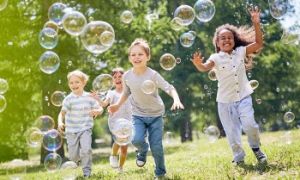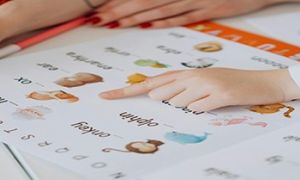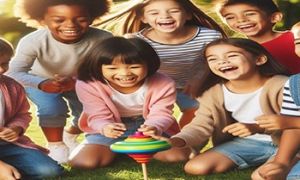

The Opposites Posters enable children to learn the concept of opposites. Opposites are pairs of words that directly contrast each other or are opposites. These posters have colour images to help children grasp this concept. These are great to display within the learning environment.
Early childhood is a busy time – there are so many new objects to look at and touch, sensations to experience and activities to explore. Not surprisingly then, it is common for children to occasionally have trouble paying attention. However, adding a sensory component or enhancing the existing sensory features of an activity can help promote attention and engagement. The following article provides strategies and activity ideas for auditory, visual, tactile, oral, and movement sensory stimulation.
NAIDOC Week 2022 starts from 3 July to 10 July. NAIDOC Week celebrations are held across Australia to celebrate the history, culture and achievements of Aboriginal and Torres Strait Islander peoples. The following provides Activities, Crafts, Songs and Resources to celebrate NAIDOC Week and incorporate ATSI Communities into your Early Childhood Service.
A co-listening podcast for preschoolers is called Little Yarns. Little Yarns is all about the various languages, tales, and countries of Indigenous Australia and is a great listening resource in early learning services.
Saying sorry is among the earliest lessons in interpersonal behaviour that children learn when growing up. There are indeed many benefits of an apology but sometimes we forget that almost always they depend on both sides genuine feeling the emotions rather than being forced to go through the motions. The following article provides information on the Importance Of Apologising and Strategies To Support Children In Saying Sorry.
The following free workbooks are designed to allow the best opportunities to learn the Wiradjuri language and culture through games and other learning activities. Wiradjuri is one of many Aboriginal languages on the East Coast of Australia.
STEM, the word stands for Science, Technology, Engineering, and Mathematics. It is a way of education where the subjects that are mentioned above are taught in coherence with each other instead of in isolation. It focuses to make a bridge between the learning gap and experience through child-centric materials with the aim of making children active learners. The following article provides information on STEM Education, Incorporating STEM Education In Different Ways, Learning Environment and STEM and more!
Pre-writing skills are the techniques that will make a child ready for writing. It is just like you have to walk first before you run likewise pre-writing skills will help children develop fine motor skills such as hand-eye coordination which will strengthen the hand muscles. The following article provides information on Pre-Writing Skills Activities, Benefits Of Pre-Writing Skills and more.
As the words indicate, Open-ended questions have no right or wrong answers and thus cannot be answered with a simple, ‘yes’ or ‘no’. Open-ended questions figure in several of the pedagogical practices outlined in the EYLF, like ‘being responsive to children, ‘learning through play and most of all, ‘intentional teaching’. The following article provides the major benefits of using open-ended questions in the early childhood education context.
Tremendous advances in brain imaging technology over the last ten years have led to a quantum leap in brain research. Among the research areas most studied by scientists is the effect of musical experiences on the brain development of children. The following article provides information on How Music Enriches Brain Development In Children, Playing Music Vs Listening To Music, Benefits Of Music and more.
 Open ended questions cannot be responded to with one word answers such as yes or no. These types of questions enables a child to provide… Read More
Open ended questions cannot be responded to with one word answers such as yes or no. These types of questions enables a child to provide… Read More
 During your child’s preschool years, an important milestone begins to emerge. This is the development of pre-writing skills. Pre-writing skills are used to encourage, develop… Read More
During your child’s preschool years, an important milestone begins to emerge. This is the development of pre-writing skills. Pre-writing skills are used to encourage, develop… Read More
 Open ended materials enables children to play freely. They are objects that have no rules to follow, use or function. Raw materials that can be… Read More
Open ended materials enables children to play freely. They are objects that have no rules to follow, use or function. Raw materials that can be… Read More
 An Acknowledgment of the Country is a way of showing respect for the Traditional Owners and can be given by both non-Indigenous people and Aboriginal… Read More
An Acknowledgment of the Country is a way of showing respect for the Traditional Owners and can be given by both non-Indigenous people and Aboriginal… Read More
 Language plays an important role in a child’s development. It enables a child to communicate effectively with their family, learn at school, socialize with friends,… Read More
Language plays an important role in a child’s development. It enables a child to communicate effectively with their family, learn at school, socialize with friends,… Read More
 Like adults, children have to deal with their own stress in life. Moving house, starting a new school, preparing for a new sibling - these are… Read More
Like adults, children have to deal with their own stress in life. Moving house, starting a new school, preparing for a new sibling - these are… Read More
 Playdough is such a versatile material. It provides numerous benefits to children as they manipulate it, it is safe and soothing and provides children with… Read More
Playdough is such a versatile material. It provides numerous benefits to children as they manipulate it, it is safe and soothing and provides children with… Read More
 Teaching children about sustainability enables them to appreciate and respect the natural environment. Early childhood services can provide meaningful hand on learning experiences in order… Read More
Teaching children about sustainability enables them to appreciate and respect the natural environment. Early childhood services can provide meaningful hand on learning experiences in order… Read More
 Recycling is an important concept that teaches children to care for the environment. It encourages children to be responsible and show a growing appreciating for… Read More
Recycling is an important concept that teaches children to care for the environment. It encourages children to be responsible and show a growing appreciating for… Read More
 When children apply paint to paper, glue things together, or pound a lump of clay, they experiment with colour, shape design and texture.
Read More
When children apply paint to paper, glue things together, or pound a lump of clay, they experiment with colour, shape design and texture.
Read More

The following lists the sub-outcomes, examples of evidence when children achieve each sub-outcome and how...
See more...
In a world where classroom outcomes are often skewed by postcode, language background, or parental...
See more...
The following article lists 20 Cultural Games, Instructions For Each Game, Benefits Of Teaching Children These Games...
See more...© 2009-2025 Aussie Childcare Network Pty Ltd. All Rights Reserved.

